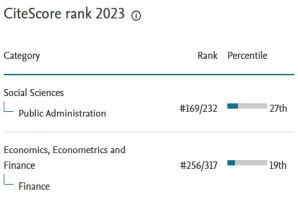A számviteli minőség metodológiai vizsgálata
A DeAngelo- és a módosított Jones-modell empirikus megközelítése
Kulcsszavak:
minőség, számviteli minőség, minőségmérési modellek, t-statisztika, M40, M41Absztrakt
Jelen tanulmány célja, hogy a vállalkozások beszámolóinak korai minőségmérési modelljeit rendszerezze, összegezze, hiszen ezek a beszámolók képezhetik a felhasználói kör döntéshozatali alapjait. A szerző minőségi szempontból a DeAngelo-modell (1986) és a módosított Jones-modell (1995) segítségével vizsgálja a Baranya megyében termelő tevékenységet végző vállalkozások beszámolóját. A beszámolók minőségét a teljes befolyásolás összes eszközzel arányos változásaként vizsgálja 2016 és 2019 között. T-statisztikával mérve a vizsgált időszakban a teljes befolyásolás negatív értéket vett fel, amely azt sugallhatja, hogy a vállalkozás vezetői jövedelemcsökkentő eredményszemléletű döntéseket hoznak. A kapott eredmények jelzésértékűek, ugyanakkor további vizsgálatokat szükséges végezni annak érdekében, hogy magabiztos következtetéssel szolgálhassunk.
Hivatkozások
Aren, S. (2003). Yöneticilerin Kar Yönetimi İle İlgili Tutumlar1 ve IMKB’de Bir Uygulama. (Ph.D.) Gebze Yüksek Teknoloji Enstitüsü1 Yay1nlangmamiş Doktora Tezi
Ball, R., Shivakmar, L. (2008). Earnings Quality at Initial Public Offerings. Journal of Accounting and Economics, Volume, 45, Issues 2-3, pp. 324–349, https://doi.org/10.1016/j.jacceco.2007.12.001
Bedőházi Z.-R. (2009). A Nemzetközi Pénzügyi Beszámolási Standarok alkalmazásának hatása a Ma gyar Tőzsdén jegyzett vállalatok számiviteli minősé gére. PhD-dolgozat, Pécs
Beest, F., Braam, G., Boelens, S. (2009). Quality of Financial Reporting: Measuring Qualitative Characteristics. NiCE Working Paper pp. 09–108, https://www.researchgate.net/publication/2548 77109_Quality_of_financial_reporting_measuring_ qualitative_characteristics
Cheung, E., Evans, E., Wright, S. (2010). A Historical Review of Quality in Financial Reporting in Australia. Pacific Accounting Review, Volume 22, Issue 2, ISSN: (0114-0582), https://doi.org/10.1108/01140581011074520
Crosby, F. B. (1995). Quality without Tears. New York, McGraw Hill Davidson, S., Stickney, C., Weil, R. (1985). Intermediate Accounting: Concepts, Methods and use (Fourth Ed.) Forthworth: Dryden Press
DeAngelo, L. E. (1986). Accounting Numbers as Market Valuation Substitutes: A Study of Management Buyouts of Public Stockholders. Accounting Review, Volumen 61, Number 3, pp. 400–420, https://shib bolethsp.jstor.org/start?entityID=https%3A%2F%2 Fidp.pte.hu%2Fsaml2%2Fidp%2Fmetadata.php& dest=https://www.jstor.org/stable/247149&site=jstor
Dechow, P. M., Sloan, R. G. (1991). Executive Incentives and the Horizon Problem: An Empirical Investigation. Journal of Accounting and Economics, Volume 14, Issue 1, pp. 51–89, https://doi.org/10.1016/0167-7187(91)90058-S
Dechow, P. M., Sloan, R. G., Sweeney, A. P. (1995). Detecting Earnings Management. Account ing Review, Volumen 70, Number 2, pp. 193– 225, https://shibbolethsp.jstor.org/start?entityID= https%3A%2F%2Fidp.pte.hu%2Fsaml2%2Fidp %2Fmetadata.php&dest=https://www.jstor.org/ stable/248303&site=jstor
Dechow, P., Weili, G., Schrand, C. (2010). Understanding Earnings Quality: A Review of the Proxies, their Determinants and their Consequences, Journal of Accounting and Economics, Volume 50, Issues 2–3, pp. 344–401, https://doi.org/10.1016/j.jacceco.2010.09.001
DeFond, M. L., Jiambalvo, J. (1994). Debt Covenant Violation and Manipulation of Accruals. Journal of Accounting and Economics, Volume 17, Issue 1–2, pp. 145–176, https://doi.org/10.1016/0165-4101(94)90008-6
Downen, T. (2014). Defining and Measuring Financial Reporting Precision. Journal of Theoretical Accounting Research, Volumen 9, Number 2, pp. 21–57, https://dx.doi.org/10.2139/ssrn.2129263
Duman, H. (2010). The Practices Of Earnings Management Effect Over The Quality. Of Finan cial Reporting And Company’s Performance In The Principle of Disclosure: An Application In IMKB. (Ph.D.), Selçuk Üniversitesi, Yay1nlangmamiş Dok tora Tezi
Ervin, L., Keith, F., Tracy, S. (1998). Earnings Management Using Asset Sales: An Internatio nal Study of Countries Allowing Noncurrent Asset Revaluation. Journal of Business Finance and Ac counting, Volume 25, Issue 9–10, pp. 1287–1317, https://doi.org/10.1111/1468-5957.00239
Gajeveszky, A. (2015). Assessing Financial Reporting Quality: Evidence from Romania. Audit Finaciar, (1583-5812)
Gill-De-Albornoz, B., Illueca, M. (2005). Earnings Management under Price Regulation: Empirical Evidence from the Spanish Electricity Industry. Energy Economics, Volume 27, Issue 2, pp. 279–304, https://doi.org/10.1016/j.eneco.2004.12.005
Healy, M., Wahlen, M. (1999). A Review of the Earnings Management Literature and its Implications for Standard Setting. Accounting Horizons, Volume 13, Issue 4, pp. 365–383, https://doi.org/10.2308/acch.1999.13.4.365
Healy, P. M. (1985). The Effect of Bonus Schemes on Accounting Decisions. Journal of Accounting and Economics, Volume 7, Issue 1–3, pp. 85–107, https://doi.org/10.1016/0165-4101(85)90029-1
Holthausen, R. W., Larcker, D. F., Sloan, R. G. (1995). Annual Bonus Schemes and the Manipulation of Earnings. Journal of Accounting and Economics, Volume 19, Issue 1, pp. 29–74, https://doi.org/10.1016/0165-4101(94)00376-G
Jaggi, B., Lee, P. (2002). Earnings Management Response to Debt Covenant Violations and Debt Restructuring. Journal of Accounting, Auditing and Finance, Volume 17, pp. 295–324, https://doi.org/10.1177/0148558X0201700402
Jones, J. (1991). Earnings Management During Import Relief Investigations. Journal of Accounting Research, Volume 29, Number 2, pp. 193–228, https://doi.org/10.2307/2491047
Keating, A., Zimmerman, J. (2000). Depreciation-policy Changes: Tax, Earnings Ma nagement, and Investment Opportunity Incentives. Journal of Accounting and Economics, Volume 28, Issue 3, pp. 359–389, https://doi.org/10.1016/S0165-4101(00)00004-5
Noriaki K., Seraku N., Takahashi F. (1984). Attractive Quality and Must-be Quality. Journal of the Japanese Society for Quality Control. Volume 14, Issue 2, pp. 39–48
Robb, W. (2014). The Effect of Analysts’ Forecasts on Earnings Management in Finan cial Institutions. The Journal of Financial Research, Volume 21, Issue 3, pp. 315–331, https://doi.org/10.1111/j.1475-6803.1998.tb00688.x
Taguchi, G. (1992). Taguchi on Robust Technology Development: Bringing Quality Engineering Upstream. ASME Press, https://doi.org/10.1115/1.800288
Teshima, N., Shuto, A. (2008). Managerial Ownership and Earnings Management. Theory and Empirical Evidence from Japan. Journal of In ternational Financial Management and Accounting, Volume 19, Issue 1, pp. 107–132, https://dx.doi.org/10.1111/j.1467-646X.2008.01018.x
Tóth G., Széles Zs. (2020). A Big4 könyvvizsgá ló cégek számviteli minőségre gyakorolt hatásának ösz szehasonlító elemzése. Válság & kilábalás: Innovatív megoldások. Konferenciakötet
Vörös J. (2010). Termelés- és szolgáltatásmenedzs ment, Akadémiai Kiadó, Budapest
Willekens, M. (2008). Effects of External Au diting in Privately Held Companies: Empirical Evidence from Belgium. Working Paper Series, https:// www.coursehero.com/file/247084/Willekens 2008
##submission.downloads##
Megjelent
Hogyan kell idézni
Folyóirat szám
Rovat
License
Authors assign copyright to Pénzügyi Szemle / Public Finance Quarterly. Authors are responsible for permission to reproduce copyright material from other sources.











